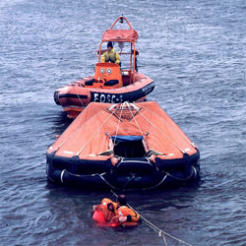It is not only fundraisers that have to be aware of charity reputation and donor care, as a call to Radio 4 showed, says Andrew Scadding.
Last week on Radio 4 was a new variation on this well-worn theme, the saga of Freshwater Bay. I’m sorry its impossible not to be invidious and name the charity, it is RNLI. This is not about tension between the fundraisers and service providers, it is about a strange but deeper disconnect.
Let me start by saying that RNLI never ceases to amaze me by the affection, even love, it inspires throughout the country. I live in Ashbourne in Derbyshire. It is possible to live further from the sea, but you have to try really hard. Yet here in the landlocked Midlands, we landlubbers have lifeboat collecting boxes in our shops, and the RNLI flag day is one of the best supported by collectors and givers alike. We love lifeboats.
So I was genuinely surprised by the saga of Freshwater Bay. As I understood it from an outraged Radio 4 interviewee, Freshwater Bay is a secluded bay – as the name rather hints – on the west coast of Wales. Our interviewee had visited as man and boy every year for 30 years, and has swum safely in waters he knows well, valuing the tranquillity and quiet of his surroundings. He seeks to pass on his pleasure to his children, as perhaps his father did to him.
His seaside idyll was rudely interrupted this year by the arrival of four lifeguards in the employ of none other than the RNLI, who have apparently subcontracted lifesaving services from the local authority.
These burly boys (and, for all I know, girls) roared up and down the beach on their quad bike, sounding a polyphonic klaxon, and shouting bossily at our friend when he went quietly for his customary swim. Disregarding his 30 years experience of safe swimming in that very spot, they sought to enforce safety by bullying, but succeeded only in destroying precisely that tranquillity and peace which Freshwater Bay holidaymakers most value. And his goodwill.
It is almost completely safe to assume that this gentleman has at some point during his life given a donation to RNLI, visited a lifeboat station, bought a tea towel. He was very likely to be an RNLI donor, it would be so hard not to be. What an opportunity, you or I might say as fundraisers, to build that relationship.
If the lifeguards had given safe sea-swimming lessons, they could have won the children over for life. What amazing role models for ten-year-olds, and what a fantastic way of teaching them how to calculate and manage the risks attached. Lifeguards might have talked to the adults, listened to their experiences and pointed out quietly any real danger points of which they seemed unaware. No-one can swim all day, most people enjoy a quiet chat. But that’s fundraiser-think.
Here’s the nub. Fundraiser or not, if you work for a charity, don’t diss the donor.








